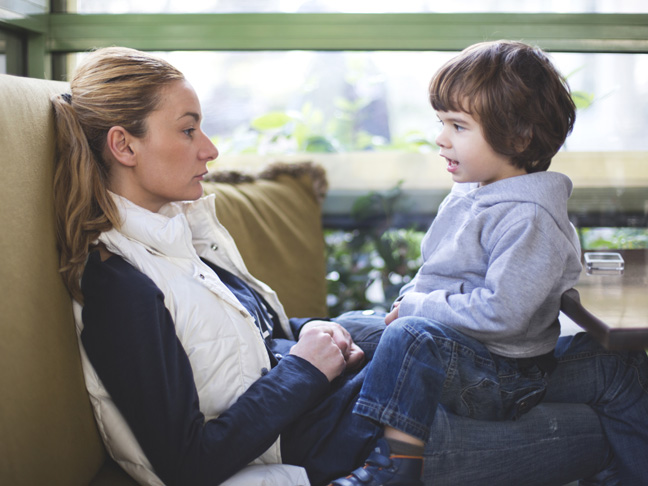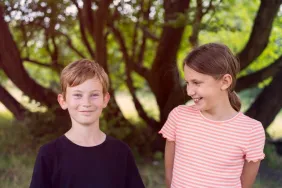I lost my dad in my early twenties, years before I even met my husband. It was a tragic and unexpected loss, and I walked hand-in-hand with grief for many years before settling into life without a father. What I’ve learned in 18 years since he died is that grief never truly leaves us. It changes form and feels a little less within reach, but it doesn’t leave for good. The heartache becomes nostalgia. The wishing becomes remembering. The sadness is replaced by memories.
Something else I learned about grief during this long stretch between loss and acceptance is that we have to talk about it. Death and grief are blanketed in isolation. Those wrapped in grief don’t always know how to talk about the loss, and those standing by don’t always know how to find the words to comfort a friend in need. It shouldn’t be this way. If we all shared more feelings and asked for more help we would all know how to show compassion and understanding in times of need.
For children, talking about death can be particularly tricky. In fact, some parents go to great lengths to avoid it as long as possible. We do this in a misguided attempt to protect them from the sadness of the world. If we don’t talk about it, we think, then they don’t have to process it. But death is part of life, and children actually encounter death in small doses early on.
Related: How to Talk to Your Kids About Scary Things
That butterfly that you insisted was “sleeping” was actually dead because the life cycle of a butterfly isn’t as long as the life cycle of a human. But that doesn’t make the life of a butterfly any less meaningful or beautiful. In these small moments, we can talk to children about life and death. We can talk about the life the butterfly lived and what will happen next.
My kids were born into this world with an empty seat at the table. To that end, we’ve been talking about death since they were old enough to ask. I remember my daughter asking that first hard question when she was closing in on her third birthday. Nothing can prepare you for talking about that kind of a loss with your children, but we chipped away at it one conversation at a time, always in developmentally appropriate words. These days we spend more time talking about memories than loss because once you’ve worked through the hard stuff, you’re left with funny tales to tell.
How to explain death to your kids? Start here:
1. Find teachable moments. If we talk about death in small doses along the way, it becomes easier to talk about a more significant loss down the road. Wilting flowers, dead bugs, and a tree that needs removal all show us that death is part of life. Elderly friends show us that aging is natural and that being old doesn’t mean no longer living. Children will work through their feelings about life and death if given the opportunity to explore them.
2. Be honest. Children are often confused by death because they are given confusing information. If you say something like, “Grandma went to sleep last night and woke up in heaven,” your child may become fearful that the same thing will happen to him (or you). Saying, “Grandma died last night,” tells your child exactly what happened. If a loved one has been sick for a long time, talk about the specific disease that caused the death. If you say, “Grandma was sick and died,” a young child may think that any sickness causes death; he needs reassurance that what happened to Grandma was specific to Grandma.
3. Answer questions. Some children are satisfied with a few facts while others ask tons of questions. The ones who have questions are likely to ask the same questions over and over again. Answer your child’s questions, even if you have to provide the very same answer on repeat for six months straight. It’s even okay to admit that you don’t know the answer to a question and that you wish you did. Processing death can be difficult for young children. They ask questions to further their understanding of it. More often than not, they are worrying about their parents or themselves. Talking is part of the process of understanding.
4. Acknowledge fears. Death can be very scary to young children. Some children become very anxious about attending funerals, particularly if viewing the body is part of the service. Empathize with your child. Talk about his fears and acknowledge that death is scary. Don’t push when it comes to attending the funeral. Sometimes a small private sendoff is the best way for young children to say goodbye to a person she loved; consider doing something together to honor that person, such as planting a tree.
5. Grieve in front of your children. Kids need to see that we all grieve when someone close to us dies. Don’t hide your tears and feelings from your kids. Normalize the grieving process by grieving with your kids.
6. Make a memory book. Some kids feel very anxious when they confront things that leave them with no control over the situation. They can’t bring back their loved one (or beloved pet) or make the sadness disappear, but they can create their own scrapbooks to preserve their memories. Write down favorite stories that your kids can glue into their books. Provide tons of pictures for cutting and pasting. Make a list of your loved one’s favorite things so that you can all recall these precious memories for years to come.
More Parenting Advice:
- How to Raise Kids Who Cope Well with Stress
- 5 Secrets to Raising Kids Who Are Kind to Others
- How to Teach Your Kids About Gender Equality
Photo: Getty








